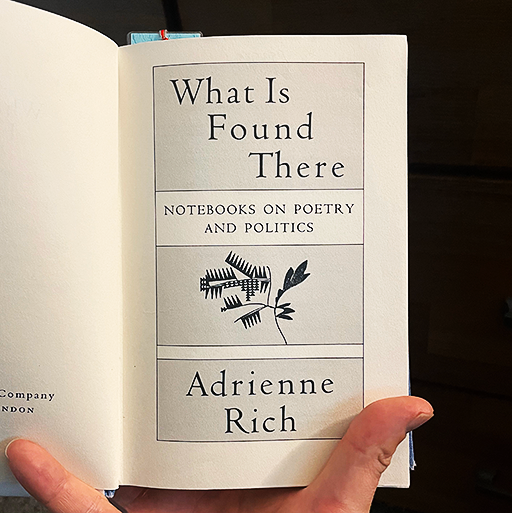What Is Found There

A quote from this book was part of the introduction to Rich’s work in her chapter of Gary Geddes’s 20th-Century Poetry & Poetics. I’m desperate to widen the scope of my reading; I want to stretch myself to uncomfortable lengths to see what benefit I can glean.
Someone said that us men must listen more to women. When I read a book that was written by a woman, that’s all I’m doing is listening. I gave Adrienne Rich my undivided attention in twenty-minute segments for several weeks under the dying summer sun, and I struggled hard to understand what she was saying.
It seemed to me that she was frustrated with the lack of power that poetry possessed in North America as compared with that of other countries—notably ones that locked poets up for inciting revolution. She also spent time wrestling with her difficulties of being not only a female poet, but a lesbian one. I’d had no idea she was gay; I’d simply read and enjoyed her work in Geddes’s book. Sexual identity in art is confounding to me. I never feel the need to know, but once I do know an artist’s orientation it becomes an annoyance when considering their work. I suspect this is how many people felt when, for example, they first saw a colleague expressing non-normative pronouns in a Zoom call. How does this affect the work exactly?
Well, it didn’t. At least, not until you brought it up.
It sounds like times were tough for lesbians in the 80s, at least according to Rich’s experience. Nowadays I’d manage it’s far less so, at least here in North America. I’m still figuring out my own poets, and while I acknowledge that it’s an ongoing process with no clearly defined terminus—aside from my inevitable demise—I know many things that it is not, and one of those is a “call to power”.
I did get one tangible benefit from reading this book, though: a new poem. Here it is.
Add Up
I’m reading Adrienne Rich’s What Is Found There,
and she’s digging with a heavy shovel
into her experience as a lesbian poet
when such a thing was hard.
I’m more fascinated by a piece of detritus
captured in the gutter of the book.
It glows orange in the hot August sun;
a tomato seed, or an insect—perhaps a fruit fly.
I should be focused on Adrienne’s words,
but I can’t pretend to understand her journey.
I’m just a straight man on a straight road,
nodding at his girlfriend, trying not to lose his way.
And so, I stop reading and write this poem.
230829